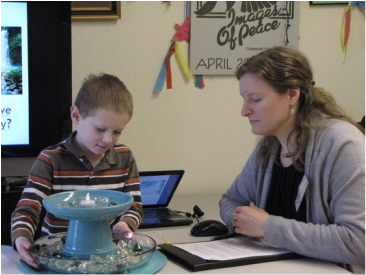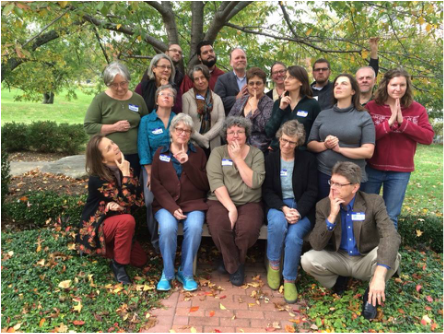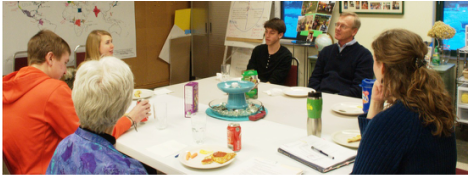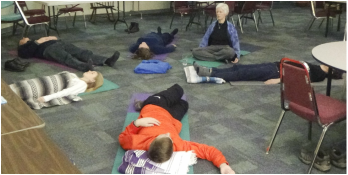Religious Education & Spiritual Growth
 A child chooses a stone for sharing a joy or sorrow, during chalice-lighting and check-in of an elementary RE class
A child chooses a stone for sharing a joy or sorrow, during chalice-lighting and check-in of an elementary RE class
Religious Education. Religious Exploration. Faith Formation. Spiritual Growth. Whatever name we give it, helping people learn and develop spiritually is a core function of religious community. And everything we do in a church is part of it – from how we worship together, to how we care for one another in times of need, to how we live out our values in the world.
In the traditional sense of classes, we have so many solid UU curricula and resources to help people of all ages to engage the big questions, to find grounding in our UU tradition, to articulate their own evolving beliefs, and to act on their convictions. I honor, support and participate in this vital work. I have enjoyed teaching many ages, from K-1 to youth group, from college students to adults, from new member classes to special topics like Integrating Your Religious Past and a Sermon-Writing Workshop Series. I enjoy offering inter-generational programming not only through multi-gen worship, but through family-friendly events and other opportunities to share community and grow together.
In the traditional sense of classes, we have so many solid UU curricula and resources to help people of all ages to engage the big questions, to find grounding in our UU tradition, to articulate their own evolving beliefs, and to act on their convictions. I honor, support and participate in this vital work. I have enjoyed teaching many ages, from K-1 to youth group, from college students to adults, from new member classes to special topics like Integrating Your Religious Past and a Sermon-Writing Workshop Series. I enjoy offering inter-generational programming not only through multi-gen worship, but through family-friendly events and other opportunities to share community and grow together.
I have a particular passion for adult spiritual growth and like to spend some of my time in this area. This may take the shape of training and supporting small group facilitators; teaching (and empowering others to teach) adult RE classes on social justice issues, theology, UU history; and encouraging spiritual practice groups. I have discovered that in RE and ministry generally, I enjoy tuning into the emerging needs of the people I am serving, and developing programming accordingly.
Spiritual Deepening
Classes, covenant groups, and retreats provide opportunities for going deeper in our religious journeys. Such experiences have been formative in my own spiritual life. I feel called in my ministry to create more pathways to spiritual deepening within UU settings, so that when people in our congregations want to take up a spiritual discipline, study a sacred text, or develop a community of practitioners who are following similar methods, they don't have to leave their UU community to do it. We can have both within our congregations - a diversity of religious beliefs and practices across the congregation as a whole, AND small groups of people who are going deep in one Source tradition, who can support each other in the particularity of their journeys. Already we have pagan, Buddhist, humanist and Christian groups in some of our congregations. More such groups can only support our collective growth.
Young adults often have deep spiritual questions and longings. I did myself - it is how I became a committed meditator. Eventually I grew less involved with my UU church, which at the time had no such offerings, finding my anchor in a meditation center. It does not have to be that way. When I was doing UU campus ministry, I developed and adapted curricula for students to meet their yearning for spiritual exploration, including discussion of some of the big theological questions, as well as the chance to try out different practices.
In talking with the youth at my intern congregation, I heard similar needs and desires. So I offered them a UU Spiritual Exploration Group that addressed key questions they wanted to know about - things like finding your purpose, images of the divine, and coping with time pressures. It is powerful for young people to explore such questions and resources, all in the company of trusted peers and supportive adults. The youth group was small. But the impact was big.
In talking with the youth at my intern congregation, I heard similar needs and desires. So I offered them a UU Spiritual Exploration Group that addressed key questions they wanted to know about - things like finding your purpose, images of the divine, and coping with time pressures. It is powerful for young people to explore such questions and resources, all in the company of trusted peers and supportive adults. The youth group was small. But the impact was big.
Small Group Spiritual Direction
 At a retreat for the Congregation-Based Spiritual Direction training series. The goofy pose... yes, we can be deep and lighthearted at the same time!
At a retreat for the Congregation-Based Spiritual Direction training series. The goofy pose... yes, we can be deep and lighthearted at the same time!
I have been delighted to experience and offer others one spiritual practice that especially lends itself to UU spiritual formation: small group spiritual direction. This mode embraces and makes use of diverse theologies and personal practices present among participants, to benefit all. As part of my professional development, I completed a 9-month certificate program for clergy on Congregation-Based Spiritual Direction, adding this tool to my toolkit for congregational ministry.
Group spiritual direction is a peer-oriented approach that can be a wonderful complement to other offerings. I offered a pilot program of virtual small group spiritual direction for seminarians at my alma mater, Meadville Lombard. I have also shared this tool with peer groups of ministers.
I look forward to making this model available to any Unitarian Universalist lay people who may have an interest in it. As with covenant groups, lay leaders can be offered training and support to facilitate the groups. Such an approach supports leadership development for the church, while also building community and helping to meet members' spiritual needs. That's what I call feeding many birds from one feeder!
Group spiritual direction is a peer-oriented approach that can be a wonderful complement to other offerings. I offered a pilot program of virtual small group spiritual direction for seminarians at my alma mater, Meadville Lombard. I have also shared this tool with peer groups of ministers.
I look forward to making this model available to any Unitarian Universalist lay people who may have an interest in it. As with covenant groups, lay leaders can be offered training and support to facilitate the groups. Such an approach supports leadership development for the church, while also building community and helping to meet members' spiritual needs. That's what I call feeding many birds from one feeder!

